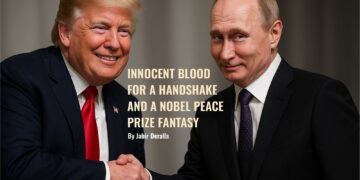Moscow has declared 40 German diplomats “personae non gratae” in Russia, thus ordering the expulsion of roughly a third of Berlin’s diplomatic corps in the country. A letter of protest against Berlin’s unfriendly policies and its expulsion of 40 Russian diplomats at the beginning of April was handed over to the German ambassador in Moscow on Monday, the Foreign Ministry said, writes news agency MIA.
A total of far more than 100 Germans are likely to be affected by the ministry’s decision, with the diplomats’ relatives also forced to leave the country. The Russian Foreign Ministry also said that German Ambassador Géza Andreas von Geyr had been informed of the Kremlin’s disapproval of recent comments made by German Foreign Minister Annalena Baerbock. Earlier this month, Baerbock described the Russian expellees as spies who had “worked every day here in Germany against our freedom, against the cohesion of our society.” She added that their work was “a threat to those who seek protection in our country.”
The war in Ukraine and the sanctions subsequently imposed on Russia have seen German-Russian relations disintegrate to an extent not seen since the Cold War. German President Frank-Walter Steinmeier on Monday referred to Russian President Vladimir Putin’s justification for the war in Ukraine as a sign of his “vicious” cynicism.
Speaking at a meeting with Ukrainian Holocaust survivors in Berlin on Monday, Steinmeier said: “Nothing shows as much as the fate of these Holocaust survivors how vicious is the cynicism with which this war has been justified by Putin.” Putin has argued that his invasion of Ukraine is an effort to stem fascism and to “de-Nazify” Ukraine.
There is no evidence that fascism had taken hold in Ukraine in the run-up to the invasion. Steinmeier was speaking to seven elderly Jewish people who are among dozens of Holocaust survivors brought to safety from Ukraine to Germany after the war began. Most of them had already been displaced several times in their lives. Now they were seeking protection “in the very city where the Holocaust was planned and organized, here in Berlin,” Steinmeier said. Steinmeier has come under fire in recent weeks for what the Ukrainian ambassador to Germany has called a “highly questionable closeness to Russia” over the course of several decades in politics. The president was once among former chancellor Gerhard Schröder’s closest confidants and subsequently served as foreign minister under Angela Merkel. Both are seen as the architects of the pro-Russia stance that imploded at the start of the war.
Schröder himself, who heads the supervisory board of the Russian state energy giant Rosneft and chairs the shareholders’ committee of the pipeline company Nord Stream, has failed to offer any criticism of Putin in the wake of his country’s invasion of Ukraine. Schröder’s defence of Russian President Vladimir Putin in a recent interview is “downright absurd” and he should resign from the Social Democratic Party (SPD) he headed for many years, current party co-leader Saskia Esken said on Monday.
In the interview with the New York Times, Schröder – chancellor from 1998 to 2005 – outright defended the head of the Kremlin against accusations of war crimes, saying that the order for mass killings had likely come from lower-ranking officials, not Putin. Resigning his mandates with Russian corporations “would have been necessary to save his reputation as a former and once-successful chancellor – unfortunately, he did not follow this advice,” Esken told Deutschlandfunk radio on Monday.
“Gerhard Schröder has been acting merely as a businessman for many years, and we should stop perceiving him as an elder statesman, as a former chancellor,” Esken said. “His defence of Vladimir Putin against accusations of war crimes is downright absurd,” she added, saying that he should resign from the SPD.















